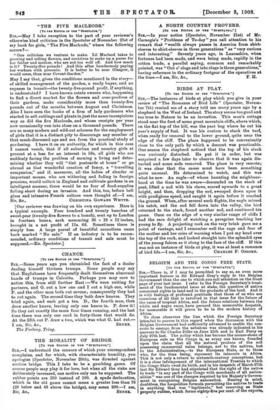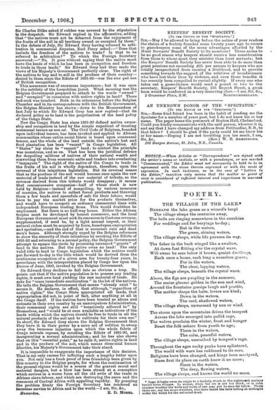BELGIUM AND THE CONGO FREE STATE. [To TIIR EDIIOlt OF
TI111 -sricoraros..-1 Sia,—There is, if I may be permitted to say so, an even more important feature in Sir Edward Grey's reply to the Belgian Government than the one to which you call attention on the front page of your last issue. I refer to the Foreign Secretary's treat- ment of the fundamental issue at stake, the question of native communal rights in land and in the products of the land. And it is with feelings of profound gratitude that those of us who are conscious of all that is involved in that issue for the future of the races of tropical Africa, and the future relations between the white and negro races, have perused this memorable despatch, for memorable it will prove to be in the modern history of Africa.
'ro close observers the line which the Foreign Secretary intended to pursue in this regard when the discussion with the Belgian Government had sufficiently advanced to enable the con- crete to emerge from the nebulous was already indicated in his answers to Sir Charles Dilke on June 25th and to Earl Percy on July 27th last. The policy which has become the corner-stone of European rule on the Congo is, as every one knows, founded upon the claim that all the natural produce of the soil possessing commercial value belongs, not to the natives, but to the Administration,—to the European State, or to those who, for the time being, represent its interests in Africa. This is not only a return to sixteenth-century conceptions, but it is a clear infringement of the international Treaties to which the Congo State owed its birth, and in his despatch of March 27th last Sir Edward Grey had stipulated that the right of the native to trade "in any part of the Congo with merchants of all nation- alities" was one of the changes required by his Majesty's Govern- ment in recognising Belgian annexation. Bearing in mind, doubtless, the Leopoldian formula permitting the natives to trade in anything that was "legitimate," but reserving as State property rubber, which forms eighty-five per cent. of the exports, Sir Charles Dilke asked if rubber was covered by the stipulation In the despatch. Sir Edward replied in the affirmative, adding
that "the natives must not be debarred from the enjoyment of the fruits of the soil in all territory owned or occupied by them." In the debate of July, Sir Edward Grey having referred to arbi- tration in commercial disputes, Earl Percy asked:—" Does that include the freedom of the natives to trade? Is that to be referred to arbitration?" To which the Foreign Secretary answered:—" No. It goes without saying that the native must have the lands of which he has been in occupation and freedom to trade in those lands." Sir Edward Grey had thus made the views of his Majesty's Government perfectly clear. The right of the natives to buy and to sell in the produce of their country— denied to them since the Edicts of 1891-92—was the sine qua non of British recognition.
This assurance was of enormous importance ; but it was open to the subtlety of the Leopoldian jurist. What meaning was the Belgian Government prepared to attach to the words " owned " and "occupied" in connexion with native rights in land? There bed-rock was touched. Both in its utterances before the Belgian Chamber and in its correspondence with the British Government, the Belgian Ministry has shown—down to the Memorandum of last July to which Sir Edward Grey has now replied—that its declared policy as to land is the perpetuation of the land policy of the Congo State.
Now the Congo State has since 1891-92 defined native owner- ship and occupation in land by the simple expedient of treating communal tenure as non est. The Civil Code of Belgium, founded upon individual tenure, has been invoked and applied to African communities whose entire social fabric is based upon communal tenure, and the whole of the land outside the native's hut and food plantation has been "vacant" in Congo legislation. All "States" lay claim to "vacant" land: to contest the principle was monstrous, and so on. That has been the juridical defence for despoiling millions of natives of their natural wealth and converting them from economic units and traders into everlasting "taxpayers." The right of the native of the Congo to trade in the fruits of his soil is wholly dependent, therefore, upon the reversal of this iniquitous legislation. But its reversal means that as the produce of the soil would become once again the raw material of trade instead of the raw material of tribute, so the revenue derived from this tribute would disappear; it means that concessionnaire companies—half of whose stock is now held by Belgium—instead of compelling, by various measures of coercion, the natives to collect forest products and throwing them a few beads and spoonfuls of salt for their labour, would have to pay the market price for the products themselves, and would have to compete on ordinary commercial lines with independent European trading firms. This would doubtless be unpleasant. But there is no half-way house. Either the African tropics must be developed by honest commerce, and the local European Government must seek its resources in Customs revenue, supplemented, if need be, by a light annual impost, or their natural riches must be acquired by force, based upon expropriation and spoliation,—and the end of that is economic ruin and dead men's bones. Although strongly urged by the Belgian reformers to show the sincerity of their intentions by revoking the Edicts of 1891-92 and returning to a normal policy, the Belgian Government attempt to square the circle by promising increased "grants" of land to the natives. But the native owns no land ! The only valid title to land in Congo legislation which the natives could put forward to-day is the title which would be derived from the continuous occupation of a given area for twenty-four years, in accordance with the interpretation placed by Congo law upon the Decree of June, 1903, invoked by the Belgian Government.
Sir Edward Grey declines to fall into so obvious a trap. He points out that if the native population is to possess any trading rights, it must own land yielding the raw material of trade. He asks for "some immediate amelioration" in the lot of the natives. He tells the Belgian Government that means "already exist" to secure it. He declares, in effect, that although," regardless of native rights," the Congo State appropriated all lands, that appropriation did not, in point of fact, alter anything at all in the Congo itself. If the natives have been treated as aliens and outcasts in their own country by an unscrupulous Administration, their communal rights are still "tenaciously adhered to" by themselves, and "would be at once available as indications of the /ands within which the natives should be free to trade in all the natural products of the soil and to cultivate for their own use." In short, Sir Edward Grey shows the Belgian Government that they have it in their power by a mere act of volition to sweep away the immense injustice upon which the whole fabric of Congo misrule reposes, by revoking the Edicts of 1891-92, and inaugurating a normal administration ; and he has also shown that on this "essential point," as he calls it, native rights in land and in the produce of the soil, which means elemental human liberties, his Majesty's Government take their stand.
It is impossible to exaggerate the importance of this decision. That is my only excuse for inflicting such a lengthy letter upon you. Not only has a fresh proof of true friendship been given by this country to the Belgian people, for whom the continuation of the present regime would be a source of the gravest moral and material dangers, but a blow has been struck at a conception which revives in a worse form all the old evils of the trade in African slave-labour, and which are destroying the races and the resources of Central Africa with appalling rapidity. By grasping the problem firmly the Foreign Secretary has rendered an immense service to Africa and to the world.—I am, Sir, &c.,







































































 Previous page
Previous page